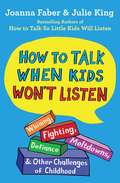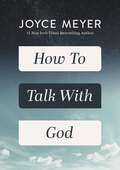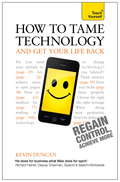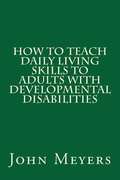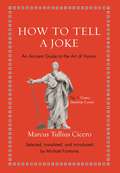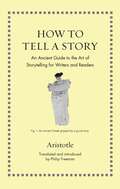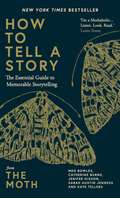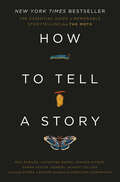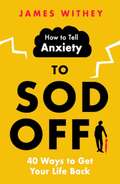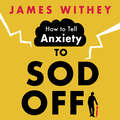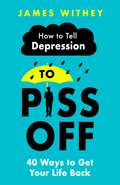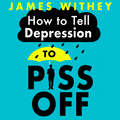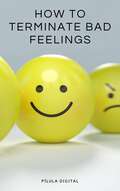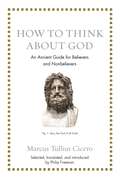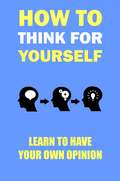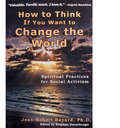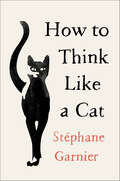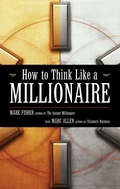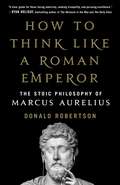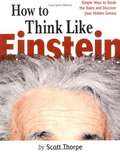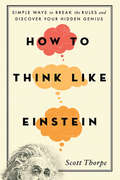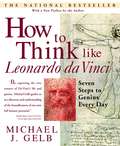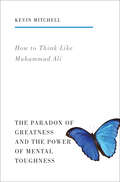- Table View
- List View
How to Talk When Kids Won't Listen: Whining, Fighting, Meltdowns, Defiance, and Other Challenges of Childhood (The How To Talk Series)
by Joanna Faber Julie KingAn all-new guide from the mega-bestselling How To Talk series applies trusted and effective communication strategies to the toughest challenges of raising children.For forty years, readers have turned to Adele Faber and Elaine Mazlish&’s How To Talk So Kids Will Listen & Listen So Kids Will Talk, the book The Boston Globe called, &“the parenting Bible,&” for a respectful and practical approach to communication with children. Expanding upon this work, Adele&’s daughter, Joanna Faber, along with Julie King, coauthored the bestselling book, How To Talk So Little Kids Will Listen. Now, Faber and King have tailored How To Talk&’s tried and trusted communication strategies to some of the most challenging childhood moments. From tantrums to technology to talking to kids about tough topics, How To Talk When Kids Won&’t Listen offers concrete strategies for these and many more difficult situations. Part One introduces readers to the How To Talk &“toolbox,&” with whimsical cartoons demonstrating the basic communication skills that will transform readers&’ relationships with children in their lives. In Part Two, Joanna and Julie answer specific questions and share relatable stories, offering practical tools for addressing issues such as homework hassles, sibling battles, digital dilemmas, problems with punishment, and more. Readers can turn directly to any topic of interest and find the help they need, with handy &“reminder pages.&” Through the combination of lively stories from real parents and teachers, humorous illustrations, and entertaining exercises, How To Talk When Kids Won&’t Listen offers real solutions to struggles familiar to every parent, grandparent, teacher, and anyone else who lives or works with children.
How to Talk with God: How To Talk With God About Everything
by Joyce MeyerEnjoy prayer in a new way as New York Times bestselling author Joyce Meyer explains the keys to unanswered prayers, the hindrances to prayer's effectiveness, and the Bible's role in prayer. Prayer is an essential part of the Christian life and an amazing privilege, but for many, it&’s challenging. There are so many different ideas about what prayer is and how to pray that it can be confusing or even intimidating. In How to Talk With God, Joyce gives simple, practical advice based on scriptures from the Bible that will help you discover the truth about prayer. She addresses common issues, such as how to communicate with God, how to know with confidence that He hears you, and how you can learn to hear His voice. But most importantly, you will learn that prayer is exciting because it&’s the key to nurturing your personal relationship with God. Refresh your daily rhythms and deepen your faith through an effective, powerful life of prayer! Derived from material previously published in The Power of Simple Prayer.
How to Tame Technology and Get Your Life Back: Teach Yourself
by Kevin DuncanTechnology can be a wonderful thing. It can also be a curse when it overwhelms us. If your phone, computer or other devices are beginning to rule your life, then you need help. We don't have to be ruled by our machines. It's time for us humans to fight back. 'How to Tame Technology' tells you exactly what to do, practical tips and simple things that you can do to regain control. Take the test and find out just how addicted you are - then learn how to cure yourself. 'I can't talk now, I'm on the phone' For those of us suffering from technological overload, it's time to pause and think. Author and Plain English commentator Kevin Duncan has trained and advised some of the UK's top companies, including Saatchi & Saatchi and Shell, in how to cope with all this. This thought-provoking book grapples with just how addicted we have become to technology and offers a set of ideas to help wean us off our technological drugs and lead a more fulfilling life. It looks briefly at how we got here, tests you on how serious your condition is and then offers real solutions, including rapid sequential tasking (v multitasking), communicating concisely, using the best method of communication for the job, all while retaining your sense of humour and enthusiasm. 'Every page is a prompt to imagine things differently. A handbook for these challenging times ahead.' Mark Earls, author of Herd  'He does for business what Nike does for sport.' Richard Hytner, Deputy Chairman, Saatchi & Saatchi Worldwide  'Anyone who owns a mobile should have this on their shelf.' Robert Ashton, author The Life Plan
How To Teach Daily Living Skills To Adults With Developmental Disabilities
by John MeyersUnderstanding basic behavioral principles is necessary to support adults with developmental disabilities (now called Intellectual Disabilities). This book is a conversational introduction to a variety of principles used to teach daily living skills to adults with developmental disabilities - including understanding the basics of behavior, assessing behaviors, writing plans, instructional processes, reinforcement, behavior management tips, data collection, ethical issues, and much more. It's like having a conversation with someone who has "been there and done that." This is an idea generating book designed to get you thinking about the services that you provide for the clients you support.
How to Tell a Joke: An Ancient Guide to the Art of Humor (Ancient Wisdom for Modern Readers)
by Marcus Tullius CiceroTimeless advice about how to use humor to win over any audienceCan jokes win a hostile room, a hopeless argument, or even an election? You bet they can, according to Cicero, and he knew what he was talking about. One of Rome’s greatest politicians, speakers, and lawyers, Cicero was also reputedly one of antiquity’s funniest people. After he was elected commander-in-chief and head of state, his enemies even started calling him “the stand-up Consul.” How to Tell a Joke provides a lively new translation of Cicero’s essential writing on humor alongside that of the later Roman orator and educator Quintilian. The result is a timeless practical guide to how a well-timed joke can win over any audience.As powerful as jokes can be, they are also hugely risky. The line between a witty joke and an offensive one isn’t always clear. Cross it and you’ll look like a clown, or worse. Here, Cicero and Quintilian explore every aspect of telling jokes—while avoiding costly mistakes. Presenting the sections on humor in Cicero’s On the Ideal Orator and Quintilian’s The Education of the Orator, complete with an enlightening introduction and the original Latin on facing pages, How to Tell a Joke examines the risks and rewards of humor and analyzes basic types that readers can use to write their own jokes.Filled with insight, wit, and examples, including more than a few lawyer jokes, How to Tell a Joke will appeal to anyone interested in humor or the art of public speaking.
How to Tell a Story: An Ancient Guide to the Art of Storytelling for Writers and Readers (Ancient Wisdom for Modern Readers)
by AristotleAn inviting and highly readable new translation of Aristotle’s complete Poetics—the first and best introduction to the art of writing and understanding storiesAristotle’s Poetics is the most important book ever written for writers and readers of stories—whether novels, short fiction, plays, screenplays, or nonfiction. Aristotle was the first to identify the keys to plot, character, audience perception, tragic pleasure, and dozens of other critical points of good storytelling. Despite being written more than 2,000 years ago, the Poetics remains essential reading for anyone who wants to learn how to write a captivating story—or understand how such stories work and achieve their psychological effects. Yet for all its influence, the Poetics is too little read because it comes down to us in a form that is often difficult to follow, and even the best translations are geared more to specialists than to general readers who simply want to grasp Aristotle’s profound and practical insights. In How to Tell a Story, Philip Freeman presents the most readable translation of the Poetics yet produced, making this indispensable handbook more accessible, engaging, and useful than ever before.In addition to its inviting and reliable translation, a commentary on each section, and the original Greek on facing pages, this edition of the Poetics features unique bullet points, chapter headings, and section numbers to help guide readers through Aristotle’s unmatched introduction to the art of writing and reading stories.
How to Tell a Story: The Essential Guide to Memorable Storytelling from The Moth
by The Moth Meg Bowles Catherine Burns Jenifer Hixson Sarah Austin Jenness Kate TellersNEW YORK TIMES BESTSELLER - The definitive guide to telling an unforgettable story in any setting, drawing on twenty-five years of experience from the storytelling experts at The MothYou are a multitude of stories. Every joy and heartbreak, every disappointment and dizzying high, has the makings of an unforgettable story. Whether your goal is to deliver the perfect wedding toast, give a moving eulogy, ace a job interview or simply connect more deeply to those around you, The Moth is here to help. A leader in the modern storytelling movement, The Moth inspires thousands of people around the globe to share their stories each year.In this book, the Moth team reveal the secrets of their time-honed process and use examples from beloved storytellers like Neil Gaiman, Elizabeth Gilbert, Nikesh Shukla, Sarfraz Manzoor and more, to show you how to:* mine your memories for your best stories* explore structures that will boost the impact of your story* deliver your stories with confidence* tailor your stories for any occasionFilled with empowering, easy-to-follow tips, this book will help you to unleash the power of storytelling on your life.
How to Tell a Story: The Essential Guide to Memorable Storytelling from The Moth
by The Moth Meg Bowles Catherine Burns Jenifer Hixson Sarah Austin Jenness Kate TellersNEW YORK TIMES BESTSELLER • The definitive guide to telling an unforgettable story in any setting, drawing on twenty-five years of experience from the storytelling experts at The Moth &“From toasts to eulogies, from job interviews to social events, this book will help you with ideas, structure, delivery and more.&”—CNNLONGLISTED FOR THE PORCHLIGHT BUSINESS BOOK AWARDOver the past twenty-five years, the directors of The Moth have worked with people from all walks of life—including astronauts, hairdressers, rock stars, a retired pickpocket, high school students, and Nobel Prize winners—to develop true personal stories that have moved and delighted live audiences and listeners of The Moth&’s Peabody Award–winning radio hour and podcast. A leader in the modern storytelling movement, The Moth inspires thousands of people around the globe to share their stories each year. Now, with How to Tell a Story, The Moth will help you learn how to uncover and craft your own unique stories, like Moth storytellers Mike Birbiglia, Rosanne Cash, Neil Gaiman, Elizabeth Gilbert, Padma Lakshmi, Darryl &“DMC&” McDaniels, Tig Notaro, Boots Riley, Betty Reid Soskin, John Turturro, and more. Whether your goal is to make it to the Moth stage, deliver the perfect wedding toast, wow clients at a business dinner, give a moving eulogy, ace a job interview, be a hit at parties, change the world, or simply connect more deeply to those around you, stories are essential. Sharing secrets of The Moth&’s time-honed process and using examples from beloved storytellers, a team of Moth directors will show you how to • mine your memories for your best stories• explore structures that will boost the impact of your story• deliver your stories with confidence• tailor your stories for any occasion Filled with empowering, easy-to-follow tips for crafting stories that forge lasting bonds with friends, family, and colleagues alike, this book will help you connect authentically with the world around you and unleash the power of story in your life.
How to Tell Anxiety to Sod Off: 40 Ways to Get Your Life Back
by James WitheyAn accessible, comforting and practical book for anyone experiencing anxiety, from the author of The Recovery Letters and How to Tell Depression to Piss Off.Despite more and more people opening up about their mental health, anxiety is still taboo. We're not supposed to be anxious; we're supposed to be resilient and able to 'get on with it'. We are expected to excel while juggling a hectic, pressurised schedule at home and at work, despite the lines between the two being more blurred than ever.This book dispels that taboo. It is for anyone who has experienced general anxiety disorder, trauma-related anxiety, clinical anxiety and those with 'low-level' anxieties.At once empathetic and entertaining, How to Tell Anxiety to Sod Off offers 40 ways to get to a better place with anxiety. They are born out of the author's personal experience of managing his own anxiety and his many years of working as a counselor helping people with their mental health.
How to Tell Anxiety to Sod Off: 40 Ways to Get Your Life Back
by James WitheyAn accessible, comforting and practical book for anyone experiencing anxiety, from the author of The Recovery Letters and How to Tell Depression to Piss Off.Despite more and more people opening up about their mental health, anxiety is still taboo. We're not supposed to be anxious; we're supposed to be resilient and able to 'get on with it'. We are expected to excel while juggling a hectic, pressurised schedule at home and at work, despite the lines between the two being more blurred than ever.This book dispels that taboo. It is for anyone who has experienced general anxiety disorder, trauma-related anxiety, clinical anxiety and those with 'low-level' anxieties.At once empathetic and entertaining, How to Tell Anxiety to Sod Off offers 40 ways to get to a better place with anxiety. They are born out of the author's personal experience of managing his own anxiety and his many years of working as a counselor helping people with their mental health.
How to Tell Anxiety to Sod Off: 40 Ways to Get Your Life Back
by James WitheyAn accessible, comforting and practical book for anyone experiencing anxiety, from the author of The Recovery Letters and How to Tell Depression to Piss Off.Despite more and more people opening up about their mental health, anxiety is still taboo. We're not supposed to be anxious; we're supposed to be resilient and able to 'get on with it'. We are expected to excel while juggling a hectic, pressurised schedule at home and at work, despite the lines between the two being more blurred than ever.This book dispels that taboo. It is for anyone who has experienced general anxiety disorder, trauma-related anxiety, clinical anxiety and those with 'low-level' anxieties.At once empathetic and entertaining, How to Tell Anxiety to Sod Off offers 40 ways to get to a better place with anxiety. They are born out of the author's personal experience of managing his own anxiety and his many years of working as a counselor helping people with their mental health.
How To Tell Depression to Piss Off: 40 Ways to Get Your Life Back
by James WitheyDepression sucks, but you don't.Trying to manage the range of symptoms that depression throws at you is like navigating the dark ocean floor when you are without a torch and don't know how to swim. How do you manage something that feels utterly unmanageable? How do you get through each day when depression is telling you you're a worthless lump of camel spleen? What you need is a guide. A really good one. You need to know what works and what to do.This book gives you 40 ways to get to a better place with depression. They are born out of the author's personal experience of clinical depression and his many years of working as a counsellor helping people with their mental health. James lives with depression and knows its lies, the traps it makes and how to dodge when it starts spitting bile in your face. Nice, eh?The ways include:- Kick your cuckoo. We don't usually encourage violence towards birds, but no cuckoos are actually harmed so don't call the RSPCA just yet. In this chapter you're encouraged to imagine your depression as an external 'thing' (no humans or animals, of course!) and that you can 'kick out', which is great fun. - Whose voice is it anyway? Spoiler alert! That nasty voice you're hearing isn't you; it's depression. The illness. When you start to recognise its voice you can start swearing back and who doesn't love a bit of swearing?- Don't listen to the lies. We all tell little lies sometimes, right? But depression is the biggest liar in the whole universe. It makes Pinocchio look like Mother Theresa. Be the lie detector to depression's fibs; call it out on its fraudulent nonsense. - Do the opposite. Depression will try to convince you to stay in bed, don't go out, don't wash, don't eat, don't phone anyone. Be Contrary Mary and do the exact opposite of what depression tells you because it never has your interests at heart. Plus, doing the opposite feels like you're a rebel, and rebels are cool (see Star Wars). At whatever point you're at with your depression, this book can help and provide some laughs along the way - hooray! - because you really need it with this bloody illness.
How To Tell Depression to Piss Off: 40 Ways to Get Your Life Back
by James WitheyDepression sucks, but you don't.Trying to manage the range of symptoms that depression throws at you is like navigating the dark ocean floor when you are without a torch and don't know how to swim. How do you manage something that feels utterly unmanageable? How do you get through each day when depression is telling you you're a worthless lump of camel spleen? What you need is a guide. A really good one. You need to know what works and what to do.This book gives you 40 ways to get to a better place with depression. They are born out of the author's personal experience of clinical depression and his many years of working as a counsellor helping people with their mental health. James lives with depression and knows its lies, the traps it makes and how to dodge when it starts spitting bile in your face. Nice, eh?The ways include:- Kick your cuckoo. We don't usually encourage violence towards birds, but no cuckoos are actually harmed so don't call the RSPCA just yet. In this chapter you're encouraged to imagine your depression as an external 'thing' (no humans or animals, of course!) and that you can 'kick out', which is great fun. - Whose voice is it anyway? Spoiler alert! That nasty voice you're hearing isn't you; it's depression. The illness. When you start to recognise its voice you can start swearing back and who doesn't love a bit of swearing?- Don't listen to the lies. We all tell little lies sometimes, right? But depression is the biggest liar in the whole universe. It makes Pinocchio look like Mother Theresa. Be the lie detector to depression's fibs; call it out on its fraudulent nonsense. - Do the opposite. Depression will try to convince you to stay in bed, don't go out, don't wash, don't eat, don't phone anyone. Be Contrary Mary and do the exact opposite of what depression tells you because it never has your interests at heart. Plus, doing the opposite feels like you're a rebel, and rebels are cool (see Star Wars). At whatever point you're at with your depression, this book can help and provide some laughs along the way - hooray! - because you really need it with this bloody illness.
How To Tell Depression to Piss Off: 40 Ways to Get Your Life Back
by James WitheyDepression sucks, but you don't.Trying to manage the range of symptoms that depression throws at you is like navigating the dark ocean floor when you are without a torch and don't know how to swim. How do you manage something that feels utterly unmanageable? How do you get through each day when depression is telling you you're a worthless lump of camel spleen? What you need is a guide. A really good one. You need to know what works and what to do.This book gives you 40 ways to get to a better place with depression. They are born out of the author's personal experience of clinical depression and his many years of working as a counsellor helping people with their mental health. James lives with depression and knows its lies, the traps it makes and how to dodge when it starts spitting bile in your face. Nice, eh?The ways include:- Kick your cuckoo. We don't usually encourage violence towards birds, but no cuckoos are actually harmed so don't call the RSPCA just yet. In this chapter you're encouraged to imagine your depression as an external 'thing' (no humans or animals, of course!) and that you can 'kick out', which is great fun. - Whose voice is it anyway? Spoiler alert! That nasty voice you're hearing isn't you; it's depression. The illness. When you start to recognise its voice you can start swearing back and who doesn't love a bit of swearing?- Don't listen to the lies. We all tell little lies sometimes, right? But depression is the biggest liar in the whole universe. It makes Pinocchio look like Mother Theresa. Be the lie detector to depression's fibs; call it out on its fraudulent nonsense. - Do the opposite. Depression will try to convince you to stay in bed, don't go out, don't wash, don't eat, don't phone anyone. Be Contrary Mary and do the exact opposite of what depression tells you because it never has your interests at heart. Plus, doing the opposite feels like you're a rebel, and rebels are cool (see Star Wars). At whatever point you're at with your depression, this book can help and provide some laughs along the way - hooray! - because you really need it with this bloody illness.
How to terminate bad feelings
by Pílula DigitalEvery human being possesses a big diversity of sentiments and emotions. Some deeply bother us, others please us. Each of our emotions contains a specific purpose and we need to learn how to deal with them in a healthy way. It's impossible to get rid of emotions. Anyhow, they are necessary and life linger to be a little boring or even dangerous if they didn’t exist. Besides that, suppressing them excessively can cause trouble. Therefore, this eBook is aimed to help you to do a good emotional regulation.
How to Think about God: An Ancient Guide for Believers and Nonbelievers (Ancient Wisdom for Modern Readers)
by Marcus CiceroA vivid and accessible new translation of Cicero’s influential writings on the Stoic idea of the divineMost ancient Romans were deeply religious and their world was overflowing with gods—from Jupiter, Minerva, and Mars to countless local divinities, household gods, and ancestral spirits. One of the most influential Roman perspectives on religion came from a nonreligious belief system that is finding new adherents even today: Stoicism. How did the Stoics think about religion? In How to Think about God, Philip Freeman presents vivid new translations of Cicero's On the Nature of the Gods and The Dream of Scipio. In these brief works, Cicero offers a Stoic view of belief, divinity, and human immortality, giving eloquent expression to the religious ideas of one of the most popular schools of Roman and Greek philosophy.On the Nature of the Gods and The Dream of Scipio are Cicero's best-known and most important writings on religion, and they have profoundly shaped Christian and non-Christian thought for more than two thousand years, influencing such luminaries as Augustine, Thomas Aquinas, Dante, and Thomas Jefferson. These works reveal many of the religious aspects of Stoicism, including an understanding of the universe as a materialistic yet continuous and living whole in which both the gods and a supreme God are essential elements.Featuring an introduction, suggestions for further reading, and the original Latin on facing pages, How to Think about God is a compelling guide to the Stoic view of the divine.
How to think for yourself: Learn to have your own opinion
by Rodrigo ChavesYou may not realize it, but everything you think has been determined by someone else. Your beliefs and convictions do not belong to you, they were dictated and you copied them. If you really want to own your thoughts, read this guide.
How to Think If You Want to Change the World: Spiritual Practices for Social Activism
by Jean-Robert BayardYou feel pain or discomfort about things that are wrong in your world, BUT you feel helpless or discouraged to do anything about it. You're hoping to be effective as an activist and make a difference BUT you feel overwhelmed or anxious. You want to deal with this head-on AND keep your sanity, BUT you feel burned out or depressed. If any of these are true, this book is for you. <P><P>Dr. Jean-Robert Bayard shares her insights to help you in your own struggles, drawing from more than six decades of experience as an activist to eliminate the suffering of others; as a psychotherapist helping patients to regain the joy of life, and as an ardent student of both Eastern and Western religious philosophies.
How to Think Like a Cat
by Stéphane GarnierDo cats worry about retirement? Nope. Do cats do things they don’t want to do? Definitely not. Do cats rush around at all hours of the day when they’d rather be licking their paws and looking out a window? Please. Calm, free, charismatic, wise, elegant, self-assured—our beloved feline pets strut those traits that we humans spend a lifetime aspiring to. No wonder everybody wants to be more like a cat. After observing his own cat, Ziggy, for years, bestselling French author Stéphane Garnier decided that he would be much happier if he could just live more like Ziggy. Closer study only confirmed his suspicion that cats have that je ne sais quoi, and he set out to share Ziggy’s innate wisdom with the world. Whether at work, at home, or in your social life, your cat can teach you how to manage stress, cultivate independence, and live life on your terms. Peppered with humorous yet inspiring tips for living a day in the life of a cat, cat secrets from Ziggy, and a quiz to assess your “cat quotient,” How to Think Like a Cat is an inspiring, humorous, and remarkably insightful guide to the subtle art of living like a feline.
How to Think Like a Millionaire
by Marc Fisher Marc AllenIn this inspiring book, millionaires Mark Fisher and Marc Allen demonstrate that success is available to all who want it and who put their desires into action. Rather than waiting for a stroke of fate to change your situation, you can immediately begin to work with your most powerful ally -- your own subconscious mind. When you do this by applying the specific and easy-to-learn principles presented here, success soon follows. By imprinting a personal success formula on your subconscious, you can program yourself to succeed, instead of failing by default or, even worse, never trying in the first place. In these pages, you'll learn how to weed out limiting beliefs and to plant positive new ones. You'll also discover other components of the millionaire mind-set, including why it's better to make quick decisions based on intuition and to stick to them rather than to vacillate, the importance of balancing persistence with flexibility, and how to effectively implement step-by-step strategies to move toward a chosen goal. Clear, simple, and wise, How to Think Like a Millionaire offers the tools you need to live the life of your dreams.
How to Think Like a Roman Emperor: The Stoic Philosophy of Marcus Aurelius
by Donald J. Robertson"This book is a wonderful introduction to one of history's greatest figures: Marcus Aurelius. His life and this book are a clear guide for those facing adversity, seeking tranquility and pursuing excellence." —Ryan Holiday, bestselling author of The Obstacle is the Way and The Daily StoicThe life-changing principles of Stoicism taught through the story of its most famous proponent.Roman emperor Marcus Aurelius was the last famous Stoic philosopher of the ancient world. The Meditations, his personal journal, survives to this day as one of the most loved self-help and spiritual classics of all time. In How to Think Like a Roman Emperor, cognitive psychotherapist Donald Robertson weaves the life and philosophy of Marcus Aurelius together seamlessly to provide a compelling modern-day guide to the Stoic wisdom followed by countless individuals throughout the centuries as a path to achieving greater fulfillment and emotional resilience. How to Think Like a Roman Emperor takes readers on a transformative journey along with Marcus, following his progress from a young noble at the court of Hadrian—taken under the wing of some of the finest philosophers of his day—through to his reign as emperor of Rome at the height of its power. Robertson shows how Marcus used philosophical doctrines and therapeutic practices to build emotional resilience and endure tremendous adversity, and guides readers through applying the same methods to their own lives.Combining remarkable stories from Marcus’s life with insights from modern psychology and the enduring wisdom of his philosophy, How to Think Like a Roman Emperor puts a human face on Stoicism and offers a timeless and essential guide to handling the ethical and psychological challenges we face today.
How to Think like Einstein: Simple Ways to Break the Rules and Discover Your Hidden Genius
by Scott ThorpeLearn how to use the tips and techniques of Albert Einstein and other great minds to solve problems in your daily life.
How to Think Like Einstein, 2E
by Scott ThorpeYou can be a genius too! Learn the skills and hacks from the greatest minds in history! From creative business and to improving relationships, How to Think Like Einstein provides the tools for the everyday challenges at the home and in the office. Innovator and author Scott Thorpe guides you step-by-step through the process of freeing yourself from your "rule ruts" so you can dream up amazing (and doable) solutions to the seemingly impossible. With brand-new material for today's readers, this new edition will reveal how you can solve problems in astonishing ways, including: • thinking like a bug • organizing a party • learning the game of poker • pretending you're James Bond • acting like a millionaire • and more!
How to Think Like Leonardo da Vinci: Seven Steps to Genius Every Day
by Michael J. GelbGenius is made, not born. And human beings are gifted with an almost unlimited potential for learning and creativity. Now you can uncover your own hidden abilities, sharpen your senses, and liberate your unique intelligence--by following the example of the greatest genius of all time, Leonardo da Vinci.Acclaimed author Michael J. Gelb, who has helped thousands of people expand their minds to accomplish more than they ever thought possible, shows you how. Drawing on Da Vinci's notebooks, inventions, and legendary works of art, Gelb introduces Seven Da Vincian Principles--the essential elements of genius--from curiosità, the insatiably curious approach to life to connessione, the appreciation for the interconnectedness of all things. With Da Vinci as your inspiration, you will discover an exhilarating new way of thinking. And step-by-step, through exercises and provocative lessons, you will harness the power--and awesome wonder--of your own genius, mastering such life-changing abilities as: *Problem solving *Creative thinking *Self-expression *Enjoying the world around you *Goal setting and life balance *Harmonizing body and mindDrawing on Da Vinci's notebooks, inventions, and legendary works of art, acclaimed author Michael J. Gelb, introduces seven Da Vincian principles, the essential elements of genius, from curiosita, the insatiably curious approach to life, to connessione, the appreciation for the interconnectedness of all things. With Da Vinci as their inspiration, readers will discover an exhilarating new way of thinking. Step-by-step, through exercises and provocative lessons, anyone can harness the power and awesome wonder of their own genius, mastering such life-changing skills as problem solving, creative thinking, self-expression, goal setting and life balance, and harmonizing body and mind.From the Trade Paperback edition.
How to Think Like Muhammad Ali: The Paradox of Greatness and the Power of Mental Toughness
by Kevin MitchellA biography of the boxing legend reveals how strategies Ali used for his successful sports career may be applied to business or personal endeavors. Muhammad Ali is the most famous boxer in the history of the sport. Three-time World Champion and the thorn in the side of Vietnam-era America, he became a moral beacon at a time when America was on its knees.But, for all his pronouncements, Ali rarely revealed the psychological training that went into his preparations before the fights. For the first time, Kevin Mitchell, one of the pre-eminent boxing writers of his generation, will get behind the public persona to reveal the psychological advantage that Ali was able to take to the ring. Mitchell demonstrates how the mental preparation Ali put into winning the heavyweight title three times are essential skills that can be applied to any walk of professional life.From the classic tactic of the rope-a-dope that Ali applied to the infamous “Rumble in the Jungle” against the favorite George Foreman, to the visualization techniques Ali applied to every fight—by having the Round number he was going to knock his opponent out in written on his taped hands—Mitchell reveals how Ali can teach something to us all and how his lessons can be applied to business and personal life equally.
